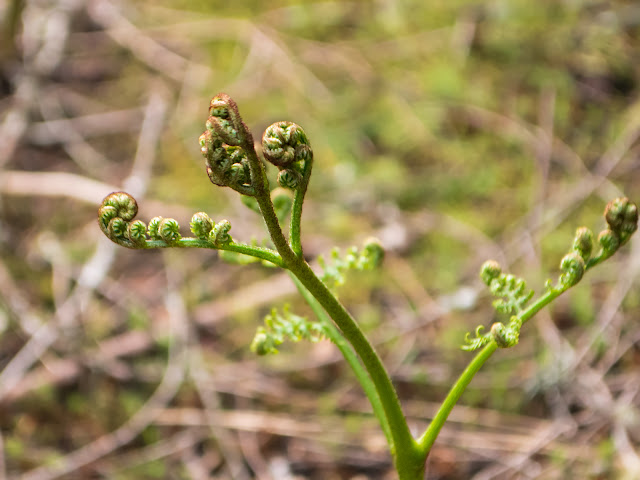The most commonly-seen ferns in our local forests are the evergreen sword ferns, and the bracken ferns, which die down in the fall and sprout again in the spring from their rhizomes underground. Maybe a better word for it is "unroll". The first to appear is a tight coil at the tip of the growing stalk. I posted photos of the coils of the evergreen ferns a while ago.
These are the growing tips of the deciduous bracken fern, Pteridium aquilinum:
 |
| New tip. Covered with dark reddish hairs. These will remain on the underside of the mature leaves. |
The varieties most common in BC belong to the subspecies
Pteridium aquilinum ssp. lanuginosum. Translating that:
Pteris, from the Greek, means fern or feathery;
aquilinum, "like an eagle" (maybe because of its wing-like structure when full grown);
lanuginosum, "hairy".
 |
| And each new branch and each new leaf unrolls from its own tight coil. |
 |
| Another, with a red-eyed fly as a topper. |
The First Nations peoples, up and down the coast, cooked and ate the rhizomes. And the fresh, still tightly-rolled tips are a spring delicacy. Mom harvested them and served them boiled, as a green vegetable, very welcome after a winter eating canned veggies. I learned to eat the tips raw; they have a delicious, nutty flavour.
Everything in moderation. Bracken fern is toxic to many animals, and contains a toxin, ptalquiloside, a carcinogen. (But what isn't?) However it is largely destroyed by cooking.
What this means is that a very normal cooking process for fiddleheads—blanching in salty water, then shocking in ice water, then sauteeing—renders the fiddlehead close to harmless. (The Atlantic)
And then, it is habitual eating that seems to cause the problem. My once or twice a year nibble on fern tips, even raw, is safe enough.
~~~~~~~~~~~~~~~~~~~~~~~~~~~~~~
Los helechos más comunes en nuestros bosques son los helechos perennes,
Polystichum munitum, y el helecho deciduo, helecho águila,
Pteridium aquilinum. Estos últimos desaparecen en el otoño y saltan desde sus rizomas en la primavera. O mejor dicho, se desenrollan. Lo primero que sale es un espiral bien enroscado, el cual, al crecer, da raiz al tallo. Subí fotos de las
roscas del helecho perenne, hace poco.
Las que siguen son fotos de las rosquitas del helecho águila.
Al principio, están cubiertos de pelos rojizos; al abrirse, este pelaje se situará en la parte inferior de las hojas.
Las variedades más comunes en Colombia Británica son las Pteridium aquilinum ssp. lanuginosum. Traduciendo eso, tenemos: Pteris, del Griego, "helecho" o "plumoso"; aquilinum, "águila", tal vez referiendo la forma, como una ala, de las hojas; y lanuginosum, "peludo".
Las naciones indígenas en nuestras costas, comían las rizomas, resecadas y tostadas. Y las puntas de los brotes nuevos, todavía bien enrolladas, son una delicia de la primavera. Mi mamá las cosechaba y las servía hervidas como una verdura, muy apreciada después del invierno, estación en la cual, en esos tiempos, estábamos limitados a comer verduras enlatadas. Yo aprendí a comer las puntas crudas, tal como las encontraba; tienen un sabor delicioso a nueces.
Todo con medida. El helecho águila resulta tóxico para muchos animales, y contiene una toxina, ptalquilosida, que es un carcinógeno. (Pero en estos dias, ¿qué cosa no lo es?) Sin embargo, la toxina se destruye, en gran parte, con el proceso de cocinar.
"Lo que esto significa es que un proceso normal de cocinar para los "fiddleheads" (puntas enroscadas de los helechos) — escaldado en aqua salada, imersión en agua helada, y luego sofriéndolas — deja el "fiddlehead" casi inocuo. (The Atlantic)
Y al fin de cuentas, parece que es el comerlos habitualmente lo que causa el problema. Mis bocadillos primaverales, saboreados una o dos veces por año, aun en crudo, no trae peligro.




I didn't know about the carcinogen...I'll have to remember that the next time I tell others about the edibility of these plants.
ReplyDeleteThe dose is important. Fern dinner every day, no. A spring treat once or twice is fine.
Delete